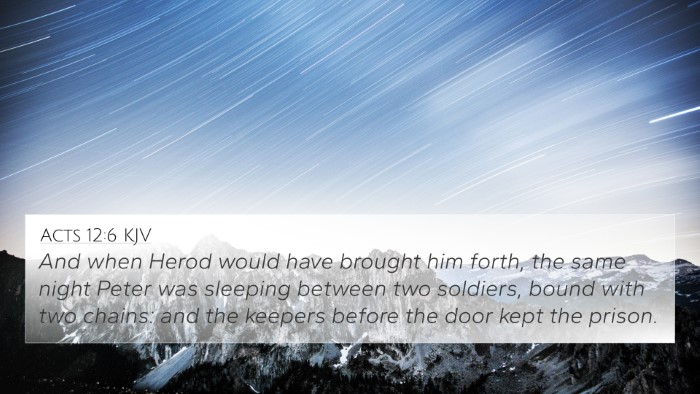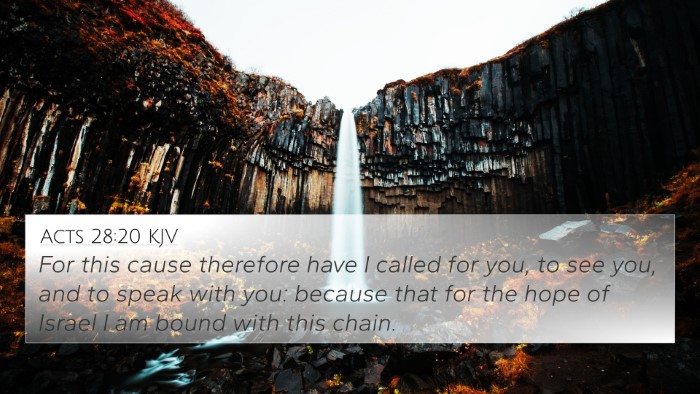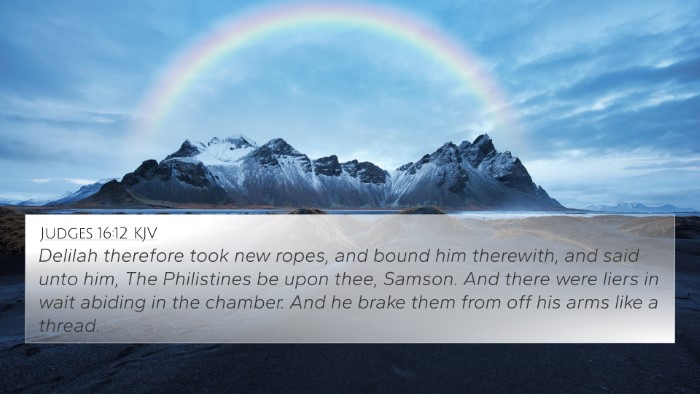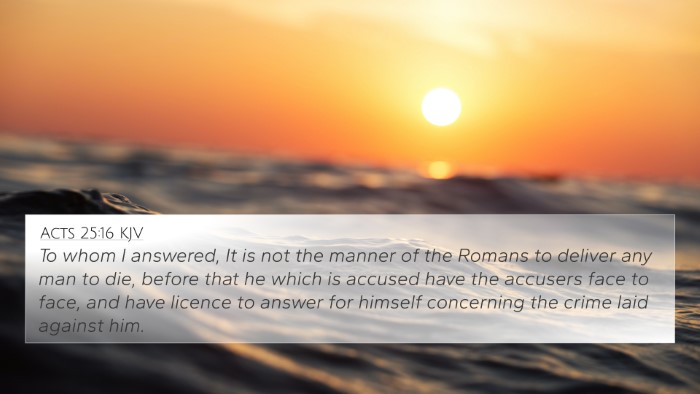Understanding Acts 21:33
The verse Acts 21:33 reads: "Then the chief captain came near, and took him, and commanded him to be bound with two chains; and demanded who he was, and what he had done." This verse captures a moment of great tension and misunderstanding involving Paul as he faced hostility and suspicion from the crowd, prompting intervention from the Roman military.
Summary of Insights
This passage is critical as it encapsulates the dynamics of authority, the role of civil governance in the context of religious fervor, and the beginning of Paul's defense, which unfolds throughout the subsequent chapters. Here, Paul is arrested under the authority of the Roman Chief Captain, highlighting the intersection of political power and religious conflict.
Commentary Insights
-
Matthew Henry: Henry articulates the importance of the chief captain's role in maintaining order. He notes that the chains symbolize how Paul was bound not just physically, but by circumstances beyond his control, demonstrating providence in the chaos.
-
Albert Barnes: Barnes draws attention to the assumptions underlying the Captain's questioning of Paul. He emphasizes the need for understanding context, suggesting that the Romans were often wary of insurrections and thus quick to assume guilt.
-
Adam Clarke: Clarke interprets this scene to reveal the complexity of Paul’s situation, having been misunderstood by both the Jews and the Romans. He points to the importance of communication and the role of leaders in discerning truth amidst conflict.
Contextual Background
Acts 21:33 occurs during a pivotal moment in the book of Acts, as Paul returns to Jerusalem and faces persecution. The surrounding text emphasizes the rising tensions against Paul, who is perceived as a disruptor of Jewish law. This verse is crucial for understanding the themes of suffering, misunderstanding, and the defense of one’s faith amidst adversity.
Bible Cross-References
The following verses provide an insightful backdrop to Acts 21:33, illustrating broader themes of conflict, authority, and justice:
- Acts 22:24 - The chief captain continues to interrogate Paul, further emphasizing the Roman authority and the gravity of the situation.
- Acts 16:22-23 - Paul's earlier experiences of being bound and beaten for preaching the Gospel set a precedent for his ongoing struggles.
- Luke 21:12 - Jesus foretells that followers will face persecution and be brought before rulers, reflecting the trials faced by Paul.
- John 15:20 - Jesus warns that His followers will be treated as He was, establishing a pattern of suffering for faith.
- Romans 13:1 - Paul teaches about submitting to governing authorities, giving context to his relationship with Roman law.
- Matthew 10:17 - Jesus instructs His disciples on facing authorities; this serves as an encouragement to Paul in his trials.
- Acts 23:1 - This later instance reveals Paul's steadfastness and commitment to God amidst challenges.
Thematic Connections
The themes encapsulated in Acts 21:33 resonate throughout the scriptures, linking various passages that deal with the intersection of faith and civil authority, the presence of suffering for righteousness’ sake, and the necessity of divine grace in times of distress.
Engaging with Cross-References
Cross-referencing Bible texts allows one to uncover the rich tapestry woven through the scriptures. Understanding how Acts 21:33 interacts with both Old and New Testament themes enhances our comprehension of God’s overarching narrative. Tools for Bible cross-referencing, like a Bible concordance or advanced cross-reference guides are essential for deeper study.
Conclusion
Acts 21:33 serves as a profound reminder of the trials faced by believers, mirroring the struggles throughout biblical history. By exploring connections between Bible verses, one gains not only historical context but also contemporary applications of faith amidst persecution. This passage, along with its cross-references, encourages readers to reflect on the complexity of following God's calling in a world fraught with challenges.


















